Nigeria national football team
The Nigeria national football team represents Nigeria in men's international football. Nicknamed as the Super Eagles it is governed by the Nigeria Football Federation (NFF). They are three-time Africa Cup of Nations winners, with their most recent title in 2013, after defeating Burkina Faso in the final. In April 1994, the Super Eagles were ranked 5th in the FIFA rankings, the highest FIFA ranking position ever achieved by an African football team. Throughout history, the team has qualified for six of the last seven FIFA World Cups (as of 2018), missing only the 2006 edition and have reached the round of 16 three times. Their first World Cup appearance was the 1994 edition. The team represents FIFA and Confederation of African Football (CAF).
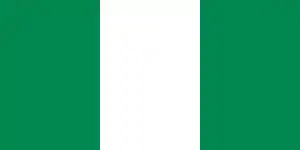 | |||
| Nickname(s) | Super Eagles | ||
|---|---|---|---|
| Association | Nigeria Football Federation | ||
| Confederation | CAF (Africa) | ||
| Sub-confederation | WAFU (West Africa) | ||
| Head coach | Gernot Rohr | ||
| Captain | Ahmed Musa | ||
| Most caps | Vincent Enyeama Joseph Yobo (101) | ||
| Top scorer | Rashidi Yekini (37) | ||
| Home stadium | Moshood Abiola National Stadium | ||
| FIFA code | NGA | ||
| |||
| FIFA ranking | |||
| Current | 35 | ||
| Highest | 5 (April 1994) | ||
| Lowest | 82 (November 1999) | ||
| First international | |||
(Freetown, Sierra Leone; 8 October 1949)[2] | |||
| Biggest win | |||
(Lagos, Nigeria; 28 November 1959) | |||
| Biggest defeat | |||
7–0 Nigeria (Accra, Gold Coast; 1 June 1955) | |||
| World Cup | |||
| Appearances | 6 (first in 1994) | ||
| Best result | Round of 16 (1994, 1998, 2014) | ||
| Africa Cup of Nations | |||
| Appearances | 18 (first in 1963) | ||
| Best result | Champions (1980, 1994, 2013) | ||
| African Nations Championship | |||
| Appearances | 3 (first in 2014) | ||
| Best result | Runners-up (2018) | ||
| WAFU Nations Cup | |||
| Appearances | 3 (first in 2010) | ||
| Best result | Champions (2010) | ||
| Confederations Cup | |||
| Appearances | 2 (first in 1995) | ||
| Best result | Fourth place (1995) | ||
Medal record
| |||
History
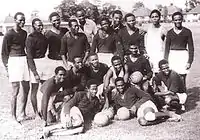
After playing other colonies in unofficial games since the 1930s,[3] Nigeria played its first official game in October 1949, while still a British colony. The team played warm-up games in England against various amateur teams including Bromley, Dulwich Hamlet, Bishop Auckland, and South Liverpool. Nigeria's match against Marine A.F.C. at Rossett Park drew 6,000 spectators, a record for the small ground.
The team's first major success was a gold medal in the 2nd All-Africa games, with 3rd-place finishes in the 1976 and 1978 African Cup of Nations to follow. In 1980, with players such as Segun Odegbami and Best Ogedegbe, the team, led by Christian Chukwu, won the Cup for the first time in Lagos. Nigeria Olympic men's football team won the football event at the 1996 Olympics in Atlanta, beating Mexico, Brazil and Argentina in the process. They were runners-up in the same event at the 2008 Olympics in Beijing, losing to Argentina in a rematch of the 1996 event.[4][5][6]
In 1984 and 1988, Nigeria reached the Cup of Nations final, losing both times to Cameroon. Three of the five African titles won by Cameroon have been won by defeating Nigeria. Missing out to Cameroon on many occasions has created an intense rivalry between both nations. Three notable occasions; narrowly losing out in the 1988 African Cup of Nations, qualifiers for the 1990 World Cup, and then the controversial final of the 2000 African Cup of Nations where a kick taken by Victor Ikpeba during the penalty shoot-out was adjudged not to have crossed the goal-line by the referee.[7]
Team image
.jpg.webp)
Kits and crest
| Wikimedia Commons has media related to Nigeria national football team kits. |
The Nigeria national team has traditionally used a mostly-solid green on green primary set with white numbering, lettering, and highlights; coupled with all-white reversed secondary kits, all emblematic of the colors of the Nigerian flag. The shade of green has varied over the years. An olive drab-tinged, forest green was frequently favored during the 1980s to the early 1990s, and jade has appeared in each of those decades as well; even harlequin has been used. Over the last decade, the team has appeared to settle on the more standard office green which most closely resembles the shade used on the flag. Nigeria's first national teams used a solid scarlet top over white shorts and socks until the country adopted its current colors after its independence.[8]
On 23 April 2015, Nike was announced to be the supplier of Nigeria's kits after Adidas ended their kit contract with the NFF.[9][10] Before that, Nike supplied Nigeria's kit between 1998 and 2003.
Kit suppliers
| Kit supplier | Period | Notes |
|---|---|---|
| 1980–1984 | ||
| 1984–1987 | ||
| 1988–1994 | ||
| 1994–2002 | ||
| 2002–2014[11] | ||
| 2015–present |
Kit deals
| Kit supplier | Period | Contract announcement | Contract duration | Value | Notes |
|---|---|---|---|---|---|
| 2015–present | 1 May 2015 – 30 October 2018 (3 years & 6 months)[12] | Total $3.75m / 743m Naira[13] | |||
| 1 November 2018 – 30 October 2022 (4 years) | Undisclosed[14] | The new deal is said to be worth significantly more than the $3.75 million on the previous deal. |
Nigeria's national team image has undergone much evolution throughout its history. Prior to independence, they were called the Red Devils due to their red topped kits.[15] The name was changed to the Green Eagles after independence in reference to the Nigerian state flag as well as the eagle which adorns the country's coat of arms. There had been deliberations for a while heading to the 1988 Africa Cup of Nations, where they were still called the Green Eagles, but at a reception after the tournament, the team's name was officially changed to the "Super Eagles".[16][17] Today, only the senior men's national team uses the nickname. The women's national team is called the "Super Falcons", and Nigeria's underage male teams are nicknamed the "Flying Eagles" & the "Golden Eaglets".
Ghana
Many important matches have been played against various nations who have been occasional rivals. Of these nations, Ghana is widely considered Nigeria's primary rival as the two sides have met one another more than any other opponent. The record is dominated by Ghana although Nigeria has enjoyed periods of success. The most notable of these periods are the early contests during the 1950s, and matches that took place in the early 2000s.
_versus_Super_Eagles_(Nigeria_national_football_team).jpg.webp)
FIFA lists the first official match between the two as a World Cup qualifier match in 1960. However both national teams had already engaged in competitive matches dating back to 1950.[18] The national teams of these two West African countries were formed during the time in which both remained protectorates of the British Empire. At that time the modern-day nation of Ghana was known as the Gold Coast. Nigeria, prior to adopting the national colors of green and white, wore scarlet tops over white shorts and were known as the "Red Devils".[8] The two sides played for several rivalry and tournament cups during this period in which full international competition was barred to them.
Cameroon
Nigeria's neighbors to the east, Cameroon, have also played Nigeria a number of times over the years. The teams have met three times in the African Cup of Nations Final with Cameroon winning each time. Both carry histories of continental success and World Cup representation that is nearly unrivaled on the African continent.
Their rivalry began in 1960 and since then, Nigeria has proved to be a more dominating team, but in all three AFCON Final matches at 1984, 1988 and 2000, Cameroon have all prevailed over Nigeria. The two national teams also repeatedly compete to show who is the best in Africa. While Cameroon has only managed to pass the group stage once, Cameroon has reached the quarter-finals, while Nigeria has been unable to do so.
Other African nations
There is also a number of competitive matches with Algeria dating back to the 1970s. The two sides met twice in the African Cup of Nations finals, with each nation splitting the win totals. It was a 1–1 draw in Algeria on 8 October 1993 that enabled Nigeria to claim its first World Cup berth in the 1994 edition of the tournament. Nigeria since then had an undefeated streak to Algeria, until the semi-finals of the 2019 Africa Cup of Nations when Algeria prevailed over Nigeria.
Nigeria's western neighbor, Benin, has played competitive matches with the team since the period of European colonization when they were known as Dahomey. But with only two wins and two draws to Benin's credit against Nigeria's fourteen wins, and with the sides having only met six times since 1980, Benin remains a lightly regarded opponent.
Argentina
.jpg.webp)
In five of its first six World Cup appearances, Nigeria was drawn in the group stage with two-time champion Argentina and is regarded by many fans as having acquitted themselves fairly against the footballing giant.[19] The fixture is the most common in the competition's history involving an African nation.[20] All five matches have been won by Argentina, but all were by a one-goal margin (2–1 in 1994, 1–0 in 2002, 1–0 in 2010, 3–2 in 2014 and 2–1 in 2018) and have been tightly contested. To date Nigeria has recorded two wins against Argentina's six, with the victories occurring during friendly matches. Nigeria came close to defeating Argentina in their first meeting, during which they held a lead for some minutes of the match. This was followed by a Confederations Cup match in 1995 which saw Nigeria hold the South Americans to a 0–0 draw. Below full international level, their Olympic teams also faced off in the gold medal match in 1996 (3–2 to Nigeria), and 2008 (1–0 to Argentina). The final of the 2005 FIFA World Youth Championship was also played between them; both Argentina goals in their 2–1 win were scored by Lionel Messi, who would go on to find the net for the senior team in the 2014[21] and 2018[22] World Cup fixtures.
The match-up holds some importance to many Nigerian football fans who regard the challenge as an important measuring stick for the development of Nigerian football. However it means less to Argentinean fans, having taken less interest with each passing cycle that Nigeria failed to engineer a meaningful competitive victory.[23][24][25][26]
Media coverage
The Nigerian football federation currently has an active deal with the parent company of AIT and Ray Power Radio.[27] Internationally, Nigeria's qualifiers and African Cup matches are regularly broadcast abroad by the multi-platform international sports network, beIN Sports and South African broadcaster SuperSport.[28] Nigeria's international friendlies are regularly scheduled in the UK through independent organizers and are marketed to the country's large population of Nigerian expatriates.
Supporters
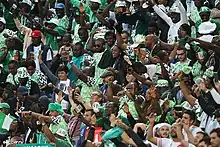
Though the club is most notable at Nigeria's home matches wearing green-themed embroidered outfits specific to the club along with wigs, hats and large sunglasses while dancing, singing, playing drums and trumpets, as well as carrying pom poms, culturally significant objects, inflatable beachballs, and waving flags; they have also shown a presence traveling abroad to support Nigeria in away matches.[29][30] However, the club's efforts at improving the atmosphere at Nigeria's home and away matches are beset by funding issues, corruption and infighting.[31] The club's current head, Dr. Rafiu Ladipo, has drawn criticism from its membership and is under pressure to defer the leadership to one of his deputies.[32]
A regular sight at Nigerian home matches is also their brass and percussion band, whose rendition of well-known Highlife songs provides Nigerian home matches with a unique feel. In Nigeria, these performers are occasionally conspicuous with their military uniforms or they may be members of the Football Supporters Club.[33] A popular chant among supporters from all over the country, after a goal scored, is "Oshe Baba!", which means "Thank you father!" in Yoruba.
Home stadium
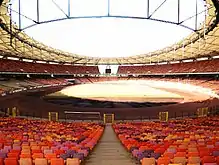
The Moshood Abiola National Stadium (formerly known as National Stadium, Abuja) serves as the official home stadium of the Super Eagles. Several international matches are played in other stadiums across the country. However, since the construction of Godswill Akpabio International Stadium in Uyo, Akwa Ibom State, most of the Super Eagles' important home matches have been played there.
Super Eagles match venues
| Stadium | Capacity | Commissioned | City | State/Territory | Ref |
|---|---|---|---|---|---|
| Godswill Akpabio International Stadium | 30,000 | 2012 | Uyo | Akwa Ibom | [34][35] |
| Stephen Keshi Stadium | 22,000 | 2018 | Asaba | Delta State | |
| Adokiye Amiesimaka Stadium | 38,000 | 2015 | Port Harcourt | Rivers | [36] |
| Abuja National Stadium | 60,491 | 2000 | Abuja | FCT | |
| Lagos National Stadium | 45,000 | 1972 | Surulere | Lagos | |
| U. J. Esuene Stadium | 16,000 | 1977 | Calabar | Cross River | |
| Teslim Balogun Stadium | 24,325 | 1984 | Surulere | Lagos | |
| Obafemi Awolowo Stadium | 25,000 | 1960 | Ibadan | Oyo | |
| Sani Abacha Stadium | 16,000 | 1998 | Kano | Kano | |
| Ahmadu Bello Stadium | 16,000 | 1965 | Kaduna | Kaduna | |
| Nnamdi Azikiwe Stadium | 22,000 | 1986 | Enugu | Enugu | |
| Liberation Stadium | 16,000 | Port Harcourt | Rivers |
Competitive record
1994 World Cup
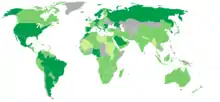
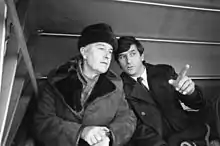
Nigeria finally reached the World Cup for the first time in 1994 after years of struggling to get there. They were managed by Clemens Westerhof. Nigeria topped their group which included Argentina, Bulgaria, and Greece. Nigeria defeated Bulgaria 3–0, lost to Argentina 1–2, and reached the second round after a 2–0 victory over Greece. In the second round Nigeria played Italy and took the lead with a goal from Emmanuel Amunike at 25 minutes. Nigeria were within two minutes of qualifying for the Quarter-finals, but Roberto Baggio scored to take the game to extra time. He also scored the eventual winning goal. The game ended 2–1 in favour of the Italians.
1998 World Cup
In 1998, Nigeria returned to the World Cup alongside Cameroon, Morocco, Tunisia, and South Africa. Optimism was high due to its manager Bora Milutinović and the return of most 1994 squad members. In the final tournament Nigeria were drawn into group D with Spain, Bulgaria, Paraguay. Nigeria scored a major upset by defeating Spain 3–2 after coming back twice from being 1–0 and 2–1 down. The Eagles qualified for the second round with a win against Bulgaria and a loss to Paraguay. The team's hopes of surpassing its 1994 performance was shattered after a 1–4 loss to Denmark.
2002 and 2006 World Cups
The 2002 World Cup in South Korea and Japan saw Nigeria again qualify with optimism. With a new squad and distinctive pastel green kits, the Super Eagles were expected to build on its strong performances in the 2000 and 2002 African Cup of Nations. Nigeria were drawn into group F with powerhouses Sweden, Argentina, and England. The first game against Argentina started with a strong defence that kept the first half scoreless. In the 61st minute, Gabriel Batistuta breached the Nigerian defence to put Argentina in the lead 1–0, and Argentina would go on to win the game. Nigeria's second game against Sweden saw them take the lead but later lose 2–1. Nigeria then drew 0–0 with England and bowed out in the first round.
Nigeria failed to qualify for the 2006 World Cup after finishing level on points in the qualification group with Angola, but having an inferior record in the matches between the sides.[37]
2010 World Cup
On 14 November 2009, Nigeria qualified for the 2010 World Cup after defeating Kenya by 3–2 in Nairobi.[38]
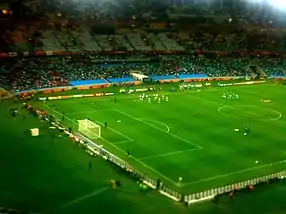
Nigeria lost its opening match against Argentina 1–0 at Ellis Park Stadium following a controversial Gabriel Heinze header in the 6th minute.[39][40] In its second game Nigeria led early on by a goal from Kalu Uche. A red card against Sani Kaita gave Greece the advantage. Greece scored the equaliser late in the first half and Nigeria conceded the second goal in the second half and lost the game 2–1. In their last group stage match against South Korea, Nigeria took an early lead in the 12th minute off of a great finish by Kalu Uche after a low cross from Chidi Odiah. However, goals from Lee Jung-Soo and Park Chu-Young gave South Korea a 2–1 lead, which looked to be enough for South Korea to advance into the round of 16. However, Nigeria got a chance in the 66th minute, on the end of a pass from Ayila Yussuf that was fed through the South Korean defense was none other than Yakubu, once the pass found Yakubu's foot about four yards away from the empty goal, Yakubu pushed the ball wide of the left post to keep South Korea still ahead 2–1. Three minutes later, Yakubu was able to calmly finish a penalty to knot the score at two apiece, but the damage was done as Nigeria was unable to score again and the match ended in a 2–2 draw. With this result, Nigeria was eliminated from the 2010 World Cup with just one point, while South Korea advanced into the round of 16 with four points. On 30 June 2010, following the team's early exit and poor showing, the then President of Nigeria, Goodluck Jonathan suspended the national football team from international competition for two years.[41] This suspension put the team at risk of being banned from international football by FIFA for reasons of political interference.[42]
On 5 July 2010, the Nigerian government rescinded its ban of the national football team from FIFA/CAF football competitions,[43] but the sanction of suspension was applied by FIFA some three months after.[44] On 4 October 2010, Nigeria was indefinitely banned from international football due to government interference following the 2010 World Cup.[44] Four days later, however, the ban was "provisionally lifted" until 26 October, the day after the officially unrecognised National Association of Nigerian Footballers (NANF) dropped its court case against the NFF.[45]
2014 World Cup
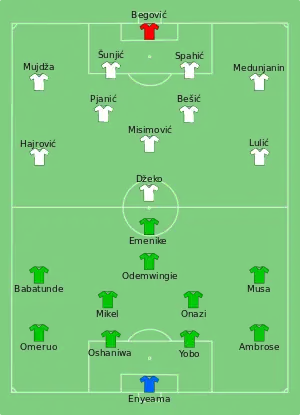
Nigeria's campaign in the 2014 FIFA World Cup opened with a disappointing 0–0 draw against Iran. Four days later the team played their second game against Bosnia and Herzegovina. A controversial 29th-minute Peter Odemwingie goal gave Nigeria their first World Cup win since 1998. They faced Argentina another four days later: a 3rd minute Lionel Messi goal for the opposition was followed almost instantly with an equalizer by Ahmed Musa. Messi gave Argentina the lead back just before half-time. In the second half Musa leveled the game out again, Lionel Messi was substituted and handed over his captaincy to Marcos Rojo only for Rojo to put Argentina 3–2 ahead minutes later.
Nigeria lost the match, but still qualified for the round of 16. In the Round of 16 Nigeria faced France, an 18th-minute stabbed shot from Emmanuel Emenike saw the ball in the net, past the French goal-keeper but the goal was ruled off-side by the linesman. Nigeria held them off until the 79th minute when a cross and a Paul Pogba header gifted France the lead. An accidental own goal by Super Eagles Captain Joseph Yobo in injury time put the result beyond any doubt: Nigeria was out. This is the third time Nigeria is eliminated in the round of 16 and they were not still able to enter the Quarter-finals in the FIFA World Cup.
2018 World Cup
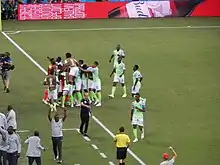
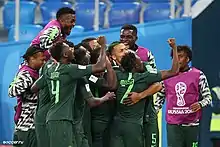
On 24 June 2016, The Confederation of African Football released the draw for the 3rd round of the World Cup qualifiers which saw Nigeria grouped in what was described as a "group of death"; alongside Zambia, Algeria, and Cameroon. Nigeria started their group stage matches with a 2–1 win over Zambia in Ndola[46] and defeated Algeria 3–1 in their second match at the Godswill Akpabio International Stadium.[47] They went on to beat Cameroon 5–1 home and away in a back to back contest.[48]
The Super Eagles of Nigeria became the first African team to qualify for the 2018 FIFA World Cup after beating Zambia 1–0 in Uyo.[49][50][51] On 3 June 2018, coach Gernot Rohr unveiled a 23-man squad for the 2018 FIFA World Cup.[52] Nigeria lost their first match of the tournament 0–2 to Croatia in Kaliningrad,[53] before they won 2–0 in the second match against brave Iceland,[54] with Ahmed Musa scoring both goals.[55] Nigeria had a huge chance to qualify to the next round as Argentina was demolished 3–0 by Croatia. Despite this advantage, they lost 2–1 in their last group stage match against Argentina,[56] with one goal by Victor Moses.[57] For this defeat, and followed with Iceland's defeat to Croatia, Nigeria missed the opportunity to advance to the round of 16 and got eliminated from the tournament.[58]
| FIFA World Cup record | |||||||||
|---|---|---|---|---|---|---|---|---|---|
| Year | Round | Position | Pld | W | D | L | GF | GA | |
| Did not enter | |||||||||
| Did not qualify | |||||||||
| Withdrew[n 1][59] | |||||||||
| Did not qualify | |||||||||
| Round of 16 | 9th | 4 | 2 | 0 | 2 | 7 | 4 | ||
| Round of 16 | 12th | 4 | 2 | 0 | 2 | 6 | 9 | ||
| Group stage | 27th | 3 | 0 | 1 | 2 | 1 | 3 | ||
| Did not qualify | |||||||||
| Group stage | 27th | 3 | 0 | 1 | 2 | 3 | 5 | ||
| Round of 16 | 16th | 4 | 1 | 1 | 2 | 3 | 5 | ||
| Group stage | 21st | 3 | 1 | 0 | 2 | 3 | 4 | ||
| TBD | |||||||||
| TBD | |||||||||
| Total | Round of 16 | 6/21 | 21 | 6 | 3 | 12 | 23 | 30 | |
- Notes
- All African nations withdrew due to a lack of qualifying berths.
Africa Cup of Nations record
The Nigeria Senior National Team holds the record of being the most decorated team in Africa Cup of Nations history, the team have won a total of fifteen medals: three gold, four silver and eight bronze in eighteen AFCON appearances and failed to win a medal in just three AFCON competition in which it participated.
1963–1978
Nigeria first appeared in the Africa Cup of Nations in 1963, when they were drawn in a group with Sudan, and the then United Arab Republic. They did not advance to the next stage.
The team withdrew from two African Cup of Nations between 1963 and 1974, due to political instability. In 1976, they came back to the Cup of Nations with third-place finishes in both the 1976 and 1978 Africa cup of Nations
1980–1990
Nigeria hosted the 1980 Africa Cup of Nations and also won their first Cup of Nations Title that year in Lagos. Nigeria came out as runners-up three times and had one group stage elimination, between 1982 and 1990. They also failed to qualify for the 1986 Africa Cup of Nations hosted by Egypt.
1992–2006
Nigeria appeared again in the African cup of Nations in 1992 and 1994, they finished third in 1992 and won the 1994 Africa Cup of Nations, which was the second time they won the tournament. In 1996 the team withdrew from the tournament under pressure from the country's military dictator Sani Abacha due to the criticism received from the tournament hosts South Africa and especially its president Nelson Mandela, for the execution of Ogoni activist Ken Saro-Wiwa. Nigeria was subsequently banned from entering the 1998 African Cup of Nations. In 2000 they returned to the Cup of Nations and were the runner-up. They later finished in third place at the 2002, 2004 and 2006 Africa Cup of Nations.
2008–2017
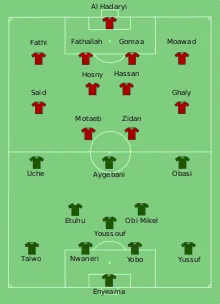
In the 2008 Africa Cup of Nations, Nigeria ended their campaign in the quarter finals after losing to Ghana. They qualified for 2010 Africa Cup of Nations, hosted by Angola, but were eliminated by Ghana in the semi-finals. They failed to qualify for the 2012 Africa Cup of Nations after ending the qualifiers with a 2–2 draw against Guinea with goals from Ikechukwu Uche and Victor Obinna.
Nigeria came back in the 2013 Africa Cup of Nations hosted in South Africa; after playing through the tournament with an unbeaten run, they defeated Burkina Faso in the finals to lift the Cup for the third time. However, they did not qualify for either of the next two tournaments.[60]
2019 Cup of Nations
The Super Eagles started their campaign at the 2019 AFCON by defeating Burundi 1–0 in group B opening match. They went on to defeat Guinea and lost 2–0 to Madagascar in their final group stage match. The round of 16 saw the national football team of Nigeria defeating Cameroon 3–2 with goals coming from Jude Ighalo and Iwobi, they later went on to confront South Africa in the quarter-finals of the tournament. An 89th-minute header from Troost-Ekong gave Nigeria the lead over South Africa and the match ended 2–1 in favour of Nigeria. Nigeria faced Algeria in the semi-finals and were knocked out of the tournament after a 95th minute free kick from Riyad Mahrez gave Algeria the lead. The Super Eagles later faced Tunisia in a third pace match which they won 1–0 with the only goal coming from Ighalo which made him the top scorer of the tournament.
2021 Africa Cup of Nations
On 18 July 2019, the Confederation of African Football (CAF) released the draw for the 2021 Africa Cup of Nations qualification. The Super Eagles were grouped in group L alongside Lesotho, Benin, and Sierra Leone. Nigeria started out by defeating Benin 2–1 at Uyo in their first group match and later went on to beat Lesotho 4–2 in an away match. In March 2020, as a result of the COVID-19 pandemic, the Confederation of African Football (CAF), postponed all AFCON qualifiers indefinitely.[61]
| Africa Cup of Nations record | ||||||||
|---|---|---|---|---|---|---|---|---|
| Host nation(s) / Year | Round | Position | Pld | W | D* | L | GF | GA |
| Not affiliated to CAF | ||||||||
| Withdrew | ||||||||
| Group stage | 6th | 2 | 0 | 0 | 2 | 3 | 10 | |
| Withdrew | ||||||||
| Did not qualify | ||||||||
| Withdrew | ||||||||
| Did not qualify | ||||||||
| Third place | 3rd | 6 | 3 | 1 | 2 | 11 | 10 | |
| Third place | 3rd | 5 | 2 | 2 | 1 | 8 | 5 | |
| Champions | 1st | 5 | 4 | 1 | 0 | 8 | 1 | |
| Group stage | 6th | 3 | 1 | 0 | 2 | 4 | 5 | |
| Runners-up | 2nd | 5 | 1 | 3 | 1 | 7 | 8 | |
| Did not qualify | ||||||||
| Runners-up | 2nd | 5 | 1 | 3 | 1 | 5 | 3 | |
| Runners-up | 2nd | 5 | 3 | 0 | 2 | 5 | 6 | |
| Third place | 3rd | 5 | 4 | 0 | 1 | 8 | 5 | |
| Champions | 1st | 5 | 3 | 2 | 0 | 9 | 3 | |
| Withdrew | ||||||||
| Banned | ||||||||
| Runners-up | 2nd | 6 | 4 | 2 | 0 | 12 | 5 | |
| Third place | 3rd | 6 | 3 | 2 | 1 | 4 | 2 | |
| Third place | 3rd | 6 | 4 | 1 | 1 | 11 | 5 | |
| Third place | 3rd | 6 | 4 | 1 | 1 | 7 | 3 | |
| Quarter-finals | 7th | 4 | 1 | 1 | 2 | 3 | 3 | |
| Third place | 3rd | 6 | 3 | 1 | 2 | 6 | 4 | |
| Did not qualify | ||||||||
| Champions | 1st | 6 | 4 | 2 | 0 | 11 | 4 | |
| Did not qualify | ||||||||
| Third place | 3rd | 7 | 5 | 0 | 2 | 9 | 7 | |
| To be determined | ||||||||
| Total | 3 Titles | 18/32 | 93 | 50 | 22 | 21 | 131 | 89 |
- *Denotes draws including knockout matches decided on penalty kicks.
- **Red border color indicates tournament was held on home soil.
African Nations Championship record
Nigeria have qualified for two of the last three African Nations Championship. Their first appearance in the tournament was in 2014 when they lost to Ghana in the semi-finals and later beat Zimbabwe 1–0 to take third place in the Tournament. Nigeria qualified for the 2016 African Nations Championship but were eliminated in the group stage. They qualified again for the 2018 edition of the Championship to be hosted in Morocco after beating Benin Republic 2–0 (2–1 on aggregate) at the Sani Abacha Stadium, Kano.
| African Nations Championship record | |||||||||
|---|---|---|---|---|---|---|---|---|---|
| Host nation(s) / Year | Round | Position | Pld | W | D* | L | GF | GA | |
| Did not qualify | |||||||||
| Third place | 3rd | 6 | 3 | 2 | 1 | 12 | 8 | ||
| Group stage | 10th | 3 | 1 | 1 | 1 | 5 | 3 | ||
| Runners-up | 2nd | 6 | 4 | 1 | 1 | 7 | 6 | ||
| To be determined | |||||||||
| Total | Runners-up | 3/5 | 15 | 8 | 4 | 3 | 24 | 17 | |
WAFU Nations Cup record
| WAFU Nations Cup | ||||||||
|---|---|---|---|---|---|---|---|---|
| Host nation(s) / Year | Round | Position | Pld | W | D | L | GF | GA |
| Champions | 1st | 5 | 5 | 0 | 0 | 14 | ||
| Runners-up | 2nd | 4 | 1 | 0 | 0 | 9 | ||
| Did not enter | ||||||||
| Runners-up | 2nd | 4 | 1 | 0 | 0 | 9 | ||
| To be determined | ||||||||
| Total | 1 Title | 3/4 | 13 | 7 | 0 | 0 | 32 | 9 |
FIFA Confederations Cup
Nigeria first appeared in the FIFA Confederations Cup in 1995, after they won the 1994 Cup of Nations which was their second African Cup of Nations Title. Despite having been absent for years, they returned to the competition in 2013 as the team to represent Africa after their successful run in the 2013 Cup of Nations and they were placed in group B where they lost to both Spain and Uruguay in the last two group stage matches after beating Tahiti 6–1 in their first match. They lost out of qualification to the 2017 FIFA Confederations Cup after failing to qualify for the 2017 Cup of Nations.
| FIFA Confederations Cup record | |||||||||
|---|---|---|---|---|---|---|---|---|---|
| Year | Round | Position | Pld | W | D * | L | GF | GA | Squad |
| Did not qualify | |||||||||
| Fourth place | 4th | 3 | 1 | 2 | 0 | 4 | 1 | Squad | |
| Did not qualify | |||||||||
| Group stage | 5th | 3 | 1 | 0 | 2 | 7 | 6 | Squad | |
| Did not qualify | |||||||||
| Total | Fourth place | 2/10 | 6 | 2 | 2 | 2 | 11 | 7 | - |
Olympic Games record
|
African Games
| |||||||||||||||||||||||||||||||||||||||||||||||||||||||||||||||||||||||||||||||||||||||||||||||||||||||||||||||||||||||||||||||||||||||||||||||||||||||||||||||||||||||||||||||||||||||||||||||||||||||||||||
Honours
|
Intercontinental gold medal (1996 Olympics Atlanta, USA.
Continental
|
Sub-Continental
Others
|
Awards
|
Recent results and fixtures
Win Draw Loss
The following is a list of match results in the last 12 months, as well as any future matches that have been scheduled.
2020
| 9 October Friendly | Nigeria | Cancelled | | Austria |
| CEST | ||||
| Note: The match was cancelled after the Fédération Ivoirienne de Football announced they won't be able to send a team to Austria for the match due to some internal issues.[66] | ||||
| 9 October Friendly | Nigeria | 0–1 | | Sankt Veit an der Glan, Austria |
| 20:30 CEST | Report | Bensebaini |
Stadium: Jacques Lemans Arena Referee: Manuel Schüttengruber (Austria) |
| 13 October Friendly | Nigeria | 1–1 | | Sankt Veit an der Glan, Austria |
| 19:00 CEST | Iheanacho |
Report | Dräger |
Stadium: Jacques Lemans Arena Referee: Sebastian Gishamer (Austria) |
| 13 November 2021 AFCON Q | Nigeria | 4–4 | | Benin City, Nigeria |
| 17:00 UTC+1 | Report | Stadium: Samuel Ogbemudia Stadium Referee: Gilbert Cheruiyot (Kenya) |
| 17 November 2021 AFCON Q | Sierra Leone | 0-0 | | Freetown, Sierra Leone |
| WAT | Stadium: National Stadium |
Current team status
2021 Africa Cup of Nations qualification
| Pos | Team | Pld | W | D | L | GF | GA | GD | Pts | Qualification | |||||
|---|---|---|---|---|---|---|---|---|---|---|---|---|---|---|---|
| 1 | 4 | 2 | 2 | 0 | 10 | 7 | +3 | 8 | Qualify for final tournament | — | 2–1 | 4–4 | 30 Mar | ||
| 2 | 4 | 2 | 1 | 1 | 3 | 2 | +1 | 7 | 22 Mar | — | 1–0 | 1–0 | |||
| 3 | 4 | 0 | 3 | 1 | 5 | 6 | −1 | 3 | 0–0 | 30 Mar | — | 1–1 | |||
| 4 | 4 | 0 | 2 | 2 | 3 | 6 | −3 | 2 | 2–4 | 0–0 | 22 Mar | — |
2022 FIFA World Cup qualification – CAF Second Round
| Pos | Team | Pld | W | D | L | GF | GA | GD | Pts | Qualification | |||||
|---|---|---|---|---|---|---|---|---|---|---|---|---|---|---|---|
| 1 | 0 | 0 | 0 | 0 | 0 | 0 | 0 | 0 | Advance to third round | — | TBD | TBD | TBD | ||
| 2 | 0 | 0 | 0 | 0 | 0 | 0 | 0 | 0 | TBD | — | TBD | TBD | |||
| 3 | 0 | 0 | 0 | 0 | 0 | 0 | 0 | 0 | TBD | TBD | — | TBD | |||
| 4 | 0 | 0 | 0 | 0 | 0 | 0 | 0 | 0 | TBD | TBD | TBD | — |
Personnel
The Nigerian Super Eagles managerial staff is made up of a technical adviser who serves as the coach in charge of full international matches and a chief coach who serves as the first assistant coach in charge of the home-based Super Eagles as well as the CHAN tournament and other home based competitions. Other positions also include the technical assistants and the goalkeeper trainer. Gernot Rohr is the Super Eagle's Technical Adviser, he has held this position since 2016.[67][68][69][70]
| Position | Name |
|---|---|
| Technical Adviser | |
| Technical Director | |
| Technical Assistant | |
| Technical Assistant II | |
| Technical Assistant III | |
| Video Analyst | |
| Assistant Coach I | |
| Assistant Coach II | |
| Goalkeeper Trainer |
Players
The following players were called up for the 2022 African Cup of Nations qualifying matches against Sierra Leone in Nigeria and Sierra Leone on 13 and 17 November 2020 respectively.[73]
Caps and goals current as of 17 November 2020 after the match against Sierra Leone.
| No. | Pos. | Player | Date of birth (age) | Caps | Goals | Club |
|---|---|---|---|---|---|---|
| 16 | GK | Daniel Akpeyi | 3 August 1986 | 20 | 0 | |
| 1 | GK | Maduka Okoye | 28 August 1999 | 4 | 0 | |
| 23 | GK | Sebastian Osigwe | 26 March 1994 | 0 | 0 | |
| 5 | DF | William Troost-Ekong | 1 September 1993 | 45 | 2 | |
| 6 | DF | Leon Balogun | 28 June 1988 | 36 | 0 | |
| 20 | DF | Chidozie Awaziem | 1 January 1997 | 19 | 1 | |
| 2 | DF | Ola Aina | 8 October 1996 | 18 | 0 | |
| 3 | DF | Jamilu Collins | 5 August 1994 | 16 | 0 | |
| 13 | DF | Semi Ajayi | 8 October 1993 | 15 | 0 | |
| 21 | DF | Tyronne Ebuehi | 16 December 1995 | 8 | 0 | |
| 22 | DF | Kevin Akpoguma | 19 April 1995 | 4 | 0 | |
| 17 | DF | Zaidu Sanusi | 13 June 1997 | 3 | 0 | |
| 18 | MF | Alex Iwobi | 3 May 1996 | 44 | 9 | |
| 8 | MF | Peter Etebo | 9 November 1995 | 37 | 1 | |
| 11 | MF | Samuel Chukwueze | 22 May 1999 | 17 | 3 | |
| 10 | MF | Joe Aribo | 21 July 1996 | 6 | 2 | |
| 12 | MF | Frank Onyeka | 1 January 1998 | 1 | 0 | |
| 7 | FW | Ahmed Musa | 14 October 1992 | 95 | 15 | Unattached |
| 14 | FW | Kelechi Ịheanachọ | 3 October 1996 | 29 | 9 | |
| 9 | FW | Victor Osimhen | 29 December 1998 | 10 | 5 | |
| 19 | FW | Paul Onuachu | 28 May 1994 | 9 | 1 | |
| 15 | FW | Emmanuel Dennis | 15 November 1997 | 3 | 0 | |
| 4 | FW | Chidera Ejuke | 2 January 1998 | 2 | 0 | |
Recent call-ups
The following players have also been called up to the Nigeria squad within the last 12 months.
| Pos. | Player | Date of birth (age) | Caps | Goals | Club | Latest call-up |
|---|---|---|---|---|---|---|
| GK | Dele Alampasu | 24 December 1996 | 1 | 0 | v. | |
| GK | Tobias Lawal | 7 June 2000 | 0 | 0 | v. | |
| GK | Mathew Yakubu | 9 March 1999 | 0 | 0 | v. | |
| DF | Kenneth Omeruo | 17 October 1993 | 53 | 1 | v. | |
| MF | Samuel Kalu | 26 August 1997 | 15 | 2 | v. | |
| MF | Mikel Agu | 27 May 1993 | 7 | 0 | v. | |
| MF | Samson Tijani | 17 May 2002 | 1 | 0 | v. | |
| MF | Wilfred Ndidi | 16 December 1996 | 36 | 0 | v. | |
| FW | Moses Simon | 12 July 1995 | 35 | 5 | v. | |
| FW | Cyriel Dessers | 8 December 1994 | 1 | 0 | v. | |
INJ Withdrew because of an injury. | ||||||
Records
- As of 30 November 2020[74]
- Players in bold are still active, at least at club level.
Most capped players
|
Top goalscorers
|
.jpg.webp) Vincent Enyeama is Nigeria's most capped player alongside former Captain Joseph Yobo
|
Managers
|
 Jack Finch (1949)
Jack Finch (1949) Adewale Adegoke (1950–1952)
Adewale Adegoke (1950–1952) Jerry Beit haLevi (1960–1961)
Jerry Beit haLevi (1960–1961).svg.png.webp) József Ember (1965–1968)
József Ember (1965–1968) Sabino Barinaga (1968–1969)
Sabino Barinaga (1968–1969) Karl-Heinz Marotzke (1970–1972)
Karl-Heinz Marotzke (1970–1972) Karl-Heinz Marotzke (1973–1974)
Karl-Heinz Marotzke (1973–1974).svg.png.webp) Tiko Jelisavčić (1974–1978)
Tiko Jelisavčić (1974–1978) Otto Glória (1978–1981)
Otto Glória (1978–1981) Festus Onigbinde (1981–1984)
Festus Onigbinde (1981–1984) Manfred Höner (1986–1988)
Manfred Höner (1986–1988) Paul Hamilton (1989)
Paul Hamilton (1989) Clemens Westerhof (1989–1994)
Clemens Westerhof (1989–1994) Shuaibu Amodu (1994–1995)
Shuaibu Amodu (1994–1995) Jo Bonfrère (1995–1996)
Jo Bonfrère (1995–1996) Shuaibu Amodu (1996–1997)
Shuaibu Amodu (1996–1997) Philippe Troussier (1997)
Philippe Troussier (1997).svg.png.webp) Bora Milutinović (1997–1998)
Bora Milutinović (1997–1998) Thijs Libregts (1998–1999)
Thijs Libregts (1998–1999) Jo Bonfrère (1999–2001)
Jo Bonfrère (1999–2001) Shuaibu Amodu (2001–2002)
Shuaibu Amodu (2001–2002) Festus Onigbinde (2002)
Festus Onigbinde (2002) Christian Chukwu (2003–2005)
Christian Chukwu (2003–2005) Augustine Eguavoen (2005–2007)
Augustine Eguavoen (2005–2007) Berti Vogts (2007–2008)
Berti Vogts (2007–2008) Shuaibu Amodu (2008–2010)
Shuaibu Amodu (2008–2010) Lars Lagerbäck (2010)
Lars Lagerbäck (2010) Augustine Eguavoen (2010) (caretaker)
Augustine Eguavoen (2010) (caretaker) Stephen Keshi (2011–2014)
Stephen Keshi (2011–2014) Shuaibu Amodu (2014)
Shuaibu Amodu (2014) Stephen Keshi (2015)
Stephen Keshi (2015) Shuaibu Amodu (2015)
Shuaibu Amodu (2015) Sunday Oliseh (2015–2016)
Sunday Oliseh (2015–2016) Salisu Yusuf (2016)
Salisu Yusuf (2016) Gernot Rohr (2016–present)
Gernot Rohr (2016–present)
See also
- Nigeria national football team
- Nigeria national under-23 football team
- Nigeria national under-20 football team
- Nigeria national under-17 football team
- Nigeria national futsal team
- Nigeria national under-20 futsal team
- Nigeria national beach soccer team
- Nigeria women's national football team
- Nigeria women's national under-20 football team
- Nigeria women's national under-17 football team
- Nigeria women's national futsal team
References
- "The FIFA/Coca-Cola World Ranking". FIFA. 10 December 2020. Retrieved 10 December 2020.
- Courtney, Barrie. "Sierra Leone – List of International matches". Rec.Sport.Soccer Statistics Foundation. Retrieved 4 November 2010.
- Nigeria's First Football Captain
- Argentina routs Brazil to reach another final
- GOLD AWAITS NIGERIA OR ARGENTINA IN MEN'S OLYMPIC FOOTBAL
- FINAL Argentina 1 – Nigeria 0, Gold Medal Men's Soccer
- "Cameroon are Kings of Africa". bbc.co.uk. Retrieved 4 July 2017.
- "Nigeria, Ghana and the genesis of a rivalry". 22 November 2012. Retrieved 11 November 2016.
- "NIKE PARTNERS WITH THE NIGERIA FOOTBALL FEDERATION". Nike. 23 April 2015. Archived from the original on 9 March 2016. Retrieved 23 July 2015.
- "Nigeria Ends Kit Renewal Deal with Adidas". This Day. 13 March 2015. Archived from the original on 24 July 2015. Retrieved 23 July 2015.
- NIGERIA ENDS TIES WITH ADIDAS, AGREES KIT SPONSORSHIP DEAL WITH NIKE
- NFF sign deal with Nike
- NFF's new Nike deal worth $3.75m (743m Naira)
- Nike Extend Nigeria Kit Sponsorship to 2022 in an Undisclosed Deal
- "Super Eagles". naij.com. Retrieved 16 November 2016.
- "I don't Relax with 'Odeku' Or 'Nkwobi'-Nwosu". independent.ng. Retrieved 4 July 2017.
- "How Green Eagles changed to Super Eagles – Aloy Agu". vanguardngr.com. Retrieved 4 July 2017.
- "Nigeria vs Ghana: Head to Head". 29 January 2014. Retrieved 11 November 2016.
- "Nigeria always loses to Argentina and I'm sick of it". SB Nation. 26 June 2018. Retrieved 28 June 2018.
- "Photos of the 24-year soccer rivalry between Nigeria and Argentina". Quartz. 26 June 2018. Retrieved 28 June 2018.
- Klein, Jeff (25 June 2014). "World Cup 2014: Argentina Defeats Nigeria, 3–2". The New York Times. Archived from the original on 12 October 2017. Retrieved 28 June 2018.
- "Nigeria 1–2 Argentina". BBC Sport. 26 June 2018. Retrieved 28 June 2018.
- "2010 FIFA World Cup: Is Argentina vs. Nigeria an Emerging World Rivalry?". Bleacher Report. 3 June 2010. Retrieved 9 September 2017.
- "Nigeria-Argentina: A rivalry that keeps on running". FIFA. 25 June 2014. Retrieved 9 September 2017.
- "Nigeria-Argentina: The Eternal Rivalry". The Red Card District. 7 June 2014. Retrieved 9 September 2017.
- "Argentina prepare to renew burgeoning World Cup rivalry with Nigeria". Metro UK. 25 June 2014. Retrieved 9 September 2017.
- "Nigeria: N250m Broadcast Right, Historic – Odili". All Africa. 21 May 2008. Retrieved 16 November 2016.
- "OVERVIEW OF PROPERTIES". beIN Sports. Archived from the original on 19 October 2016. Retrieved 16 November 2016.
- "Supporters club set to storm Rio". Vanguard (Nigeria). 9 August 2016. Retrieved 16 November 2016.
- "Nigeria Football Supporters Club: Supporters club contributed to Nigeria's bronze medal victory in Rio – Ladipo". thenewsnigeria.com. 2 September 2016. Retrieved 16 November 2016.
- "Crisis rocks Nigeria Football Supporters Club". Vanguard (Nigeria). 18 July 2016. Retrieved 16 November 2016.
- "Nigerian Football Supporters Club asks Rafiu Ladipo to go". thenewsnigeria.com. 17 July 2016. Retrieved 16 November 2016.
- "Band helps boost enthusiasm for Nigeria's soccer team at Women's World Cup". winnipeg.ctvnews.ca. 12 June 2015. Retrieved 16 November 2016.
- "2 feared dead, 20 injured in stampede at Akwa Ibom new stadium". premiumtimesng.com. Retrieved 8 November 2014.
- "Akwa Ibom Stadium will host world class matches – Pinnick". The Nation. Nigeria. Retrieved 8 November 2014.
- "PHOTONEWS: Abuja National Stadium From Green Grass To Forest And Now Desert". saharareporters.com. Retrieved 9 November 2014.
- "Nigeria". gamji.com. Retrieved 14 November 2016.
- "Kenya 2–3 Nigeria". ESPN. 14 November 2009. Retrieved 14 November 2009.
- "Argentina 1–0 Nigeria". BBC. Retrieved 14 June 2010.
- "Argentina vs. Nigeria: Argentina wins, now faces a strong South Korea". The Christian Science Monitor. 12 June 2010. ISSN 0882-7729. Retrieved 18 October 2017.
- "Nigeria president suspends team". BBC Sport. 30 June 2010. Retrieved 30 June 2010.
- Adigun, Bashir; Gambrell, Jon (30 June 2010). "Nigeria's president suspends soccer team". USA Today. Retrieved 30 June 2010.
- "Nigerian government rescinds ban". ESPN Soccernet. 5 July 2010. Archived from the original on 8 July 2010. Retrieved 7 July 2010.
- "Fifa issues world ban to Nigeria". BBC News. 4 October 2010.
- "Fifa lifts Nigeria's suspension". BBC Sport. 8 October 2010. Retrieved 8 October 2010.
- Roche, C.; Dunne, Robbie (8 October 2017). "Nigeria vs Zambia World Cup: Nigeria book their place in the World Cup". Diario AS. Retrieved 17 June 2018.
- "FULL-TIME: Nigeria vs Algeria 3 -1". Vanguard News. 12 November 2016. Retrieved 17 June 2018.
- Eludini, Tunde (4 September 2017). "Cameroon Vs. Nigeria Live Updates: Super Eagles, Lions Fight In Yaoundé". Premium Times. Retrieved 17 June 2018.
- "How Nigeria vs Algeria sparked MMM trend". Vanguard News. 13 November 2016. Retrieved 14 November 2016.
- "2018 FIFA World Cup Russia™ – Matches – Nigeria-Algeria". FIFA. 12 November 2016. Retrieved 14 November 2016.
- Babarinsa, Olusola (12 November 2016). "Moses, Mikel lead Nigeria past Algeria". The Punch. Retrieved 14 November 2016.
- Udoh, Colin (3 June 2018). "Super Eagles drop Aina, Agu from World Cup squad". ESPN. Retrieved 3 June 2018.
- Abayomi, Tosin (16 June 2018). "Jerseys don't win matches, Twitter trolls Super Eagles after Croatia defeat". Pulse Nigeria. Retrieved 17 June 2018.
- Udoh, Colin (22 June 2018). "3 Takeaways from Nigeria's win over Iceland". ESPN. Retrieved 23 June 2018.
- Pylas, Pan (22 June 2018). "World Cup 2018: Ahmed Musa scores twice to give Nigeria 2–0 win over Iceland,". Stuff (company). Staff Limited. Retrieved 23 June 2018.
- "Nigeria lost to experienced Argentine side – Rohr". Vanguard News. Vanguard Media Limited. 27 June 2018. Retrieved 27 June 2018.
- Potts, Michael (26 June 2018). "Victor Moses: Chelsea fans compare Nigeria star to Eden Hazard after penalty vs Argentina". Daily Express. Express Newspapers. Retrieved 27 June 2018.
- "World Cup 2018: Nigeria eliminated by late Argentina strike". Africa News. 26 June 2018. Retrieved 28 June 2018.
- "VIII WORLD CUP (ENGLAND 1966) QUALIFYING STAGE". Lingua Sport. Retrieved 2 January 2012.
- "Afcon 2017: Nigeria fail to qualify after defeat by Egypt". BBC Sport. 29 March 2016. Retrieved 30 March 2016.
- "Coronavirus, CAF Postpones AFCON Qualifiers". goal.com. Retrieved 30 April 2020.
- West African Soccer Federation Championship (1959–67) Rec.Sport.Soccer Statistics Foundation. Retrieved 21 December 2013.
- WAFU Unity Cup (2005) Rec.Sport.Soccer Statistics Foundation. Retrieved 21 December 2013.
- Ethiopia International Tournament (1992) Rec.Sport.Soccer Statistics Foundation. Retrieved 21 December 2013.
- King Hassan II Tournament (1996–2008) Rec.Sport.Soccer Statistics Foundation. Retrieved 21 December 2013.
- "Algeria named as Nigeria's opponent after Cote 'd' Ivoire withdrawal". Goal.com. 25 September 2020. Retrieved 30 September 2020.
- "Coaches and Coaching". thenff.com. 24 November 2017.
- "Salisu Yusuf: Super Eagles coach gets new contract from NFF". pulse.ng. 26 October 2016.
- "Yusuf Finally Seals Contract With NFF As Super Eagles Chief Coach". completesportsnigeria.com. 25 October 2016.
- "Chief coach, Salisu Yusuf is in charge of CHAN". pulse.ng. 14 February 2017.
- https://www.sportsvillagesquare.com/2020/04/29/this-is-my-story-tunde-adelakun-reacts-to-comments-on-super-eagles-players-selection/
- https://www.goal.com/en/news/yobo-eager-to-start-as-super-eagles-assistant-coach/1fm4q4h1pfw4w12meuktrbo556
- "Super Eagles: Omeruo declares he's out of Super Eagles AFCON qualifiers". Score Nigeria. 5 November 2020. Retrieved 5 November 2020.
- Mamrud, Roberto. "Nigeria - Record International Players". RSSSF.
External links
| Wikimedia Commons has media related to Nigeria national football team. |